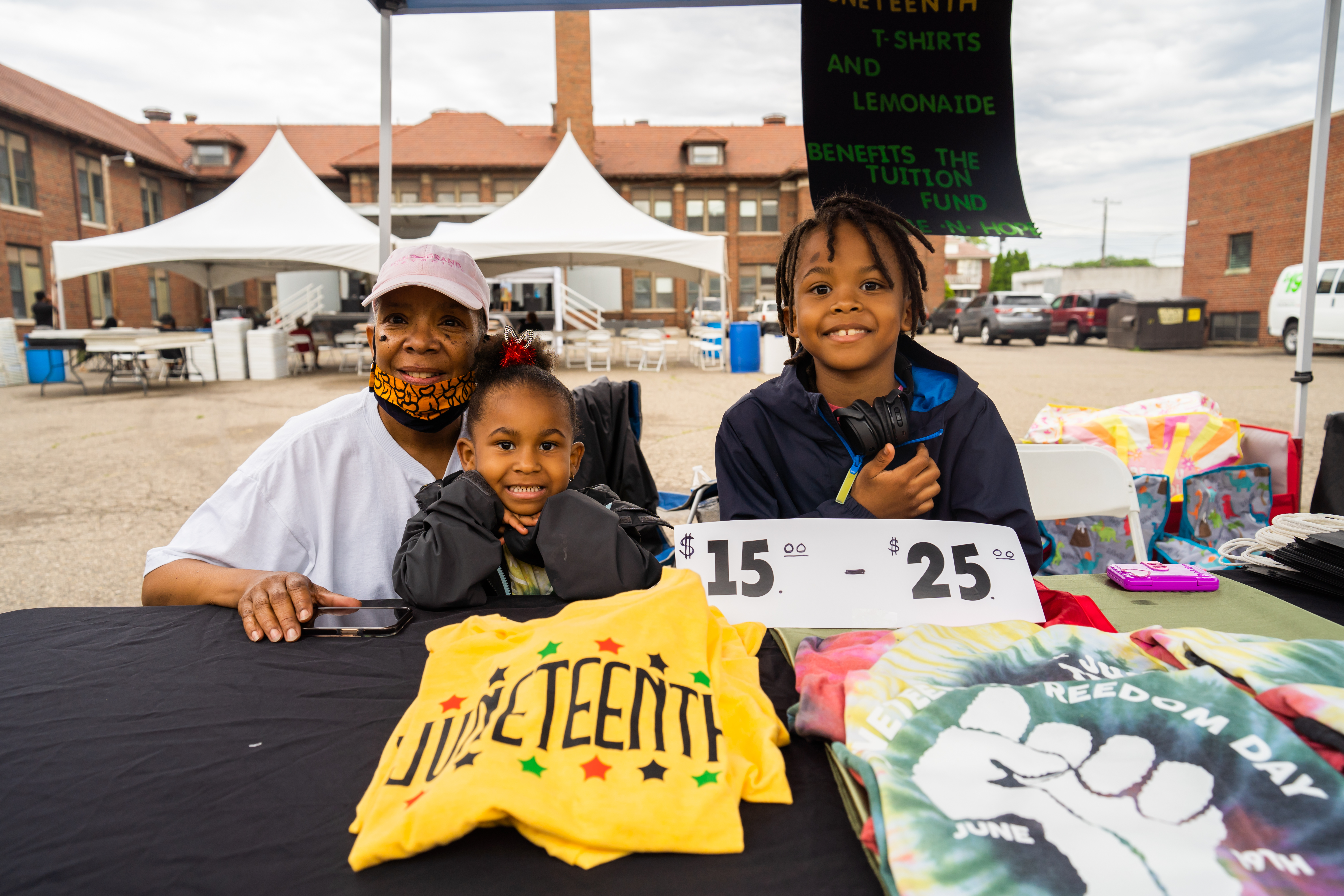While there is still a ways to go, local Black Catholic community gathers to celebrate progress toward racial justice on newest federal holiday
DETROIT — The rain held off Saturday, June 19, allowing partygoers to enjoy the first-ever Archdiocese of Detroit Black Catholic Ministry’s Juneteenth celebration.
Held in the parking lot of St. Charles Lwanga Parish in northwest Detroit, the event brought community members together to celebrate freedom and Black excellence in the form of local bands, poetry readings, food and local Black-owned businesses selling jewelry and clothing.
June 19, or Juneteenth, marks the date of the true end of slavery, said Vickie Figueroa, archdiocesan Black Catholic Ministries coordinator. After President Abraham Lincoln signed the Emancipation Proclamation in 1863, Union soldiers traveled state by state to spread the news and make sure each slave state was freed. However, the news didn’t reach Texas until June 19, 1865.
On June 17, President Joe Biden signed legislation making Juneteenth the nation’s first new federal holiday in almost four decades.
Co-hosted by the Detroit Catholic Pastoral Alliance, the celebration kicked off Friday evening with Mass celebrated by Fr. Tyrone Robinson at nearby Corpus Christi Parish.

A vendor holds up a t-shirt during the Juneteenth celebration marking important dates in the ongoing struggle for justice for the African-American community.
In his homily, Fr. Robinson told the congregation that the popular refrain “no justice, no peace” has a biblical truth to it.
“There is no peace without true justice, and so what we hear young people shouting in the streets, ‘no peace, no justice,’ is a theological truth,” Fr. Robinson said. “It is not just a chant from a civil rights group. It comes from the Scriptures. Justice brings about lasting peace. And we have hope. Pope Paul VI said, ‘If you want peace, work for justice.’ That is at the heart of a society that is seeking peace.”
Fr. Robinson recalled the Rev. Martin Luther King Jr.’s words about being a “drum major for justice,” saying that as the community celebrates Juneteenth, it is called upon to do the same, led by a deep agape love for one another.
While the party held the following day was a celebration of freedom, it was also an opportunity to educate the community about the principles of freedom, justice, family and history that undergird the new holiday.
Figueroa read aloud the U.S. Senate’s declaration, and educational pamphlets were passed out encouraging people to continue to empower and educate on the meaning of Juneteenth well beyond the day’s celebration.

Juneteenth has long been recognized and talked about by the older generations, Angela Thomas-Weldon told Detroit Catholic, but until recently, it hadn’t entered into the public conversation.
“It is good to have something meaningful to celebrate. It has been celebrated so quietly for so long, it is good that people are learning facts,” Thomas-Weldon said. “It gives us a reason to keep moving forward.”
For Yvonne Graves-Hill and her husband, Kurt Hill, the recognition and celebration of Juneteenth helps to not only bring the community closer together, but brings to light a part of history that has long been held in the shadows.
“We know that our history is sometimes good, sometimes it’s bad,” Graves-Hill said. “We need to know both sides so we don’t repeat the ugly part.”

Hill said the Catholic Church can contribute to a more just future and avoid the sins of the past by continuing to reach out to and evangelize the Black community, focusing on the needs of the individual.
“(The Church) can move forward through the actions of embracing the community and teaching about the social teachings and justice,” Hill said. “Getting more deacons and priests who look like us would enhance the situation, and they can begin to move forward by practicing what we preach.”
Although the march toward justice is ongoing, Thomas-Weldon sees the celebration and acknowledgment of Juneteenth as a federal holiday as “hopeful-sweet.”

Children play games on the sidewalk during the Archdiocese of Detroit’s first-ever Juneteenth celebration June 19.
“Let’s not concentrate on what didn’t happen; let’s concentrate on what we have accomplished and let that give us the strength,” Thomas-Weldon said. “Let’s change bittersweet to hopeful-sweet.
“Look on the bright side,” she added. “We have had an ugly past, and ugly things have happened. This doesn’t mean I don’t get angry, and it doesn’t mean that I don’t want to get out and protest all that’s happening, but then there are times like this … and I am holding onto the good.”










